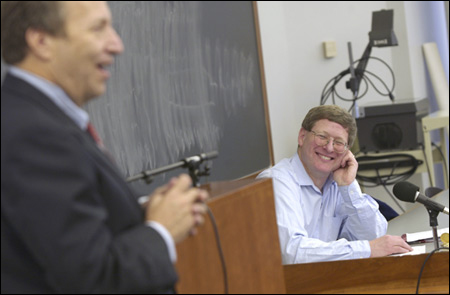President as professor
Summers visits Core course to bring real-world relevance to international economics

A guest expert with real-world experience can enliven any college class, from physics to literature.
But when that expert also happens to be the president of the university, a well-attended and eagerly attentive class is all but guaranteed.
Such was the case yesterday (Nov. 19), when President Lawrence H. Summers visited the Core course Historical Studies A-51, “The Modern World Economy, 1873-2000,” taught by Jeffry Frieden of the Government Department. Summers temporarily shed his role as president to tap his experience making economic policy – first at the World Bank and then at the U.S. Treasury, where he was secretary from 1999 to 2000 – to illustrate the central tensions that led to the collapse of the international monetary regime known as the Bretton Woods system in the early 1970s.
Animated and obviously enjoying his temporary professorial duties, Summers drew parallels between the Bretton Woods system, which the students had studied for the past week, and Mexico’s economic crisis in 1993 and 1994, in which he played a role as the U.S. undersecretary of the treasury for international affairs.
In the more current Mexican economic situation, as with the demise of the Bretton Woods system, the tension between domestic interests and international policies were central. “The whole Mexican economy was in the process of unraveling … around precisely these themes about the inconsistency between policies that served domestic interests, capital mobility, and exchange rate regimes that we’ve talked about,” he said.
Speaking extemporaneously and constantly coercing participation from the class, Summers presented a lively look at the U.S. response to Mexico’s economic woes in the early 1990s. He explained how the passing of the North American Free Trade Agreement (NAFTA) in 1993 eroded Mexico’s solid financial position by increasing inflation, which in turn increased wage demands by Mexican workers and weakened the nation’s trade position.
The Mexican elections in 1994 politicized responses to a precarious slide in investors’ confidence in the nation. Policies like raising interest rates, slowing the growth of the money supply, and mimicking the gold standard would woo back international investors, but on the domestic front, lowering interest rates would win voters.
“Domestic imperatives and international imperatives are in sharp contrast,” said Summers.
He continued to chronicle Mexico’s worsening economic situation and our nation’s response. Following the assassination of the leading Mexican presidential candidate in 1994, Summers received a phone call. “About midnight, I was sitting at home and I got this phone call from the treasury that the Mexican deputy finance minister was trying to reach me urgently. One of the things they sought was the United States to announce a credit line to Mexico, which would have the effect of expanding their level of reserve … so as to maintain a sense of increased confidence.”
The following morning, the United States did announce an expanded credit line to Mexico, although Mexico continued to lose reserves. Summers brought the class through the financial crisis, urging them to read the new memoir of his former boss – and predecessor as Secretary of the Treasury – Robert Rubin for a thorough look at this period in U.S. international economic policy.
“How much do we care if Mexico tanks?” a student asked the president. We care, Summers insisted, because of the impact Mexico’s economy had on the influx of immigrants into the United States, because of the long border our two nations share, and because at the time, Mexico was considered the basis for our nation’s new relationship with Latin America.
“It was our judgment that bad news in Mexico was bad news,” he said.
Summers, who displayed his pedagogical prowess by drawing questions, answers, and hypotheses from the students, is no stranger to the classroom; this fall, he is teaching a popular freshman seminar on globalization. Frieden, who is Stanfield Professor of International Peace, invited Summers to join his class after a lunch in which the president indicated his interest in visiting a class each year.
“He’s uniquely qualified to talk on this subject, both because of his academic research and because of his policy experience,” said Frieden.




